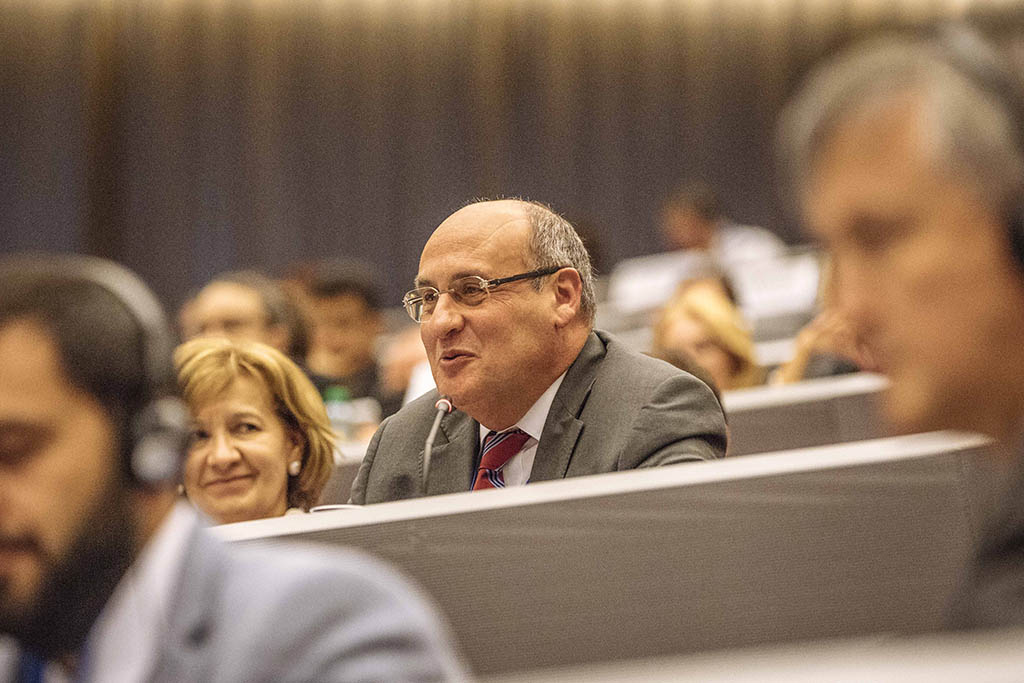
The Portuguese António Vitorino will head the International Organization for Migration (IOM) for the next five years from 1 October. He will be the second non-US heading the agency since its foundation in 1951 (the other exception was in 1961-1969).
The new Director General was appointed by acclamation, after a fourth round of voting, as he did not reach the required two-thirds majority by the IOM rules to claim victory. Concerns on potential fund cutting from the US could have been among the reasons, explaining such tight results. The US is still the IOM’s biggest contributor, counting about one third of its administrative budget on a total amount of US$1.8 billion for 2018.
However, the ‘zero tolerance’ migration’s policy of the Trump Administration, which last outcome on the southern US border resulting on the separation of parents and children still vivid, make it difficult for the remaining 168 IOM’s country members to choose for an US candidate. On the same direction, the anti-multilateralism advocacy of the president Trump on the label ‘America First’ and the consequent withdrawal from the negotiations of the UN’s Global Compacts on refugees and migration can also have helped to reverse the agency’s heading tradition and to turn to a candidate from another region.
The Global Compacts are on their final intergovernmental consultation rounds, respectively 3-5 and 9-13 July, to be adopted by the UN’s General Assembly in December. They will set the worldwide vision and the common governing guidelines (even if non-mandatory) of the international migration and international protection governances, in line with the trends of growingly massive displacements of people that foreseeably will persist in the 21st century.
The IOM is going to have a crucial monitoring and implementing role in the framework of the Global Compact on the ‘Safe, Orderly and Regular Migration’. The Agency will coordinate and is entrusted to serve as secretariat of the UN’s Network on migration, a new structure within the UN system created on initiative of the UN’s Secretary General, to support the implementation of this Global Compact, which also include the capacity building mechanism to support the Member States on their implementing efforts.
In fact, the IOM is becoming a point of reference in the debates on the social, economic and political implications of migration and is increasingly assuming a leading role as the ‘Migration Agency’ for the international migration governance. Since September 2016, it was incorporated into the UN system as ‘related Organization of the UN’, and its activities are expanding beyond the traditional operational and logistical actions related to the protection of migrants and displaced people in migration-affected communities and/or in areas of refugee resettlement and voluntary returns. The agency is also expanding and playing an increasing role on policy planning assistance.
In the same stance the EU has increased the cooperation with the IOM. The EU-IOM Strategic Cooperation Framework in place since 2012, included several European Commission services (DG DEVCO, DG ECHO, DG HOME, DG Near) and the European External Action Service (EEAS). Since 2015 such cooperation evolved and the IOM has been called to assist the operationalisation of the EU’s migration policies in its relations with origin and transit African countries. The most highlighted was the EU-IOM joint initiative with support of Germany and Italy to assist voluntary returns along the Central Mediterranean Route through Libya.
More recently, the IOM (as the UNHCR) was called in the last European Council of 28-29 June to explore the utmost controversial idea to establish ‘regional disembarkation platforms’, screening centers for migrants outside Europe, most likely in North Africa.
In such complex, disruptive and pressuring migration context in the EU and neighboring countries, it came with no surprise that the choice to head that IOM went to an European, but the extent to which the IOM can assist the EU in all of its strategies remains to be seen.
Antonio Vitorino’s profile is interesting in such pivotal changing times. He has a long and close relationship with the UN’s Secretary General António Guterres, and was his Deputy and also Defence Minister. He was also the Justice and Home Affairs (JHA) Commissioner of the Romano Prodi’s Commission (1999-2004).
As Mr. Vitorino usually says, he comes from the times where there was a need to make the case for migration to be set in the EU’s agenda. From nowadays perspective, the ‘golden years’ of the EU’s Justice and Home Affairs. The Amsterdam Treaty set the scene for the approval and implementation of the first JHA strategic programme (the Tampere Action Plan). The Commission’s Directorate-General for JHA was created in 2000, signalising the increasing role of the ‘supranational’ institutions in that policy area. During Mr. Vitorino term as Commissioner the common asylum and migration architecture started to be built under the ‘mutual trust’ principle. Fostered by the incorporation of the Schengen Convention into the Treaty, border controls, visas and combating illegal immigration schemes were put in place. In the relations with third countries, the newly EU’s competences –resulting from the transference of such policies to the Community pillar– allowed the first EU’s Regional Protection Program and resettlement schemes. Although with poor outcomes and rightly criticised to be an externalization of the EU’s migration policy, its primary objective was to offer protection to international protection seekers close to their countries.
The good news to Mr. Vitorino are that there is no need to make the case anymore to migration to be prominently on the policy agenda, even if it has been driven on a crisis-by-crisis bases. The challenges and the constraints of the Director General of the new ‘related’ UN agency in the present context are clear. Let’s sincerely hope that positive synergies and renewed energies at global level, also bring legitim expectations to other regional areas.


